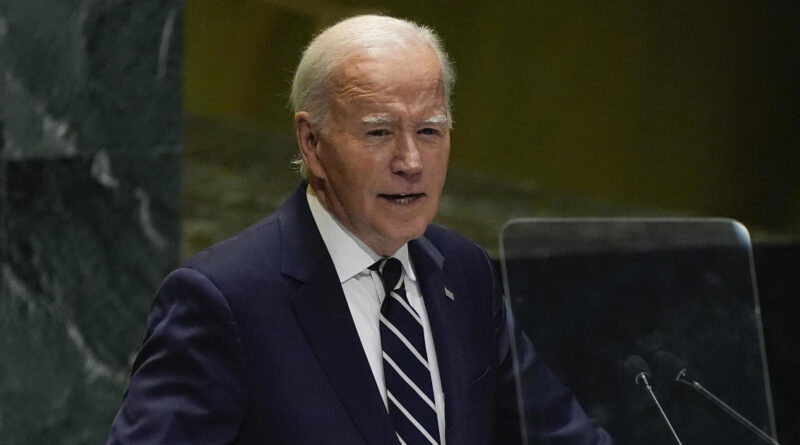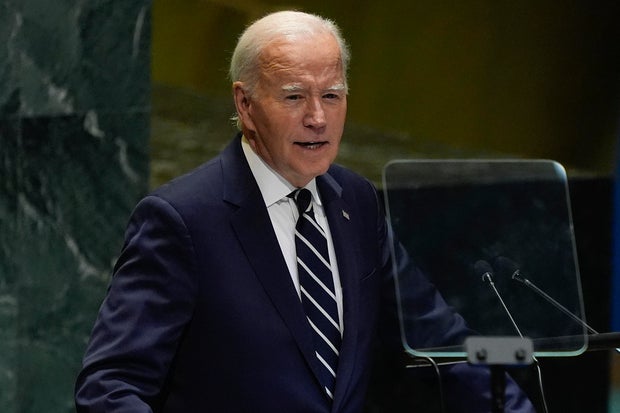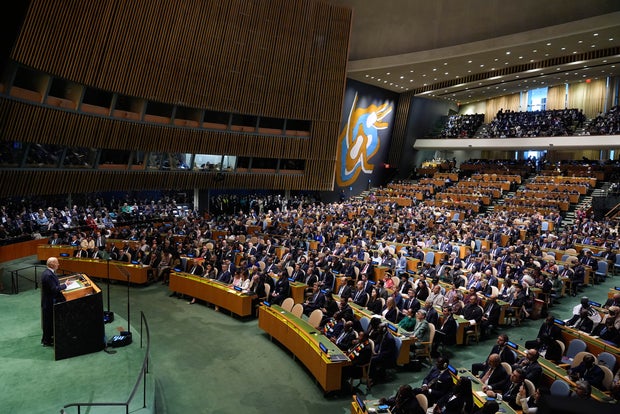Biden notes “remarkable sweep of history” in his final United Nations address as president
President Biden on Tuesday delivered his final speech to the United Nations General Assembly as president — and what could be one of his last speeches on the world stage — capping a decades-long political career that has focused heavily on foreign policy.
He noted the “remarkable sweep of history” he had seen in his over 50 years in public service, and expressed optimism, despite the continuing conflicts in the Middle East and Ukraine.
“Even from the horrors of war, there’s a way forward,” Mr. Biden said. “Things can get better. We should never forget that.”
“I know many look at the world today and see difficulties and react with despair,” the president said. “But I do not. I won’t.”
The 79th session of the United Nations General Assembly, colloquially known as UNGA, has brought leaders from across the globe to New York. The themes of the president’s speech encompassed many of his foreign policy themes throughout his administration — rallying the world around Ukraine, managing global competition and emphasizing the importance of sustaining the U.N. Charter. On Tuesday, the president urged world leaders to remember that “some things are more important than staying in power,” emphasizing the value of “we the people” after his own decision to step aside from his reelection race.
Julia Demaree Nikhinson / AP
“We must never forget who we’re here to represent,” Mr. Biden said. “We, the people. These are the first words of our Constitution, the very idea of America, and they inspired the opening words of our U.N. Charter. I’ve made the preservation of democracy the central cause of my presidency.” This summer, I faced a decision whether to seek a second term as president. It was a difficult decision. Being president has been the honor of my life. There’s so much more I want to get done. But as much as I love the job, I love my country more. I decided after 50 years of public service, it’s time for a new generation of leadership to take my nation forward. My fellow leaders, let us never forget, some things are more important than staying in power.”
The unyielding tension in the Middle East also promises to dominate much of the conference. Mr. Biden has said he believes a cease-fire and hostage negotiation agreement is close, but nearly one year after the deadly Oct. 7 Hamas attack on Israel that incited the war, a deal remains elusive. Earlier this month, Mr. Biden said Israeli Prime Minister Benjamin Netanyahu isn’t doing enough to secure a deal. Mr. Biden said the “world must not flinch” from the horrors of Oct. 7, and innocent civilians in Gaza are “also going through hell.”
“Since Oct. 7, we’ve also been determined to prevent a wider war that engulfs the entire region,” the president said. “Hezbollah, unprovoked, joined the Oct. 7 attack launching rockets into Israel. Almost a year later, too many on each side of the Israeli Lebanon border remain displaced. Full scale war is not in anyone’s interest.”
Missiles slammed into southern Lebanon on Monday, killing nearly 500 people, according to Lebanon’s health ministry, as Israel said it was targeting Hezbollah weapons hidden in residential buildings. The explosions came as Israel heralded a new wave of attacks on the Iran-backed group in Lebanon, warning civilians to flee from any buildings or areas where the organization had weapons or fighters positioned. A senior administration official called the situation between Israel and Hezbollah in Lebanon “delicate and dangerous.”
Seth Wenig / AP
Russia’s war on Ukraine is also a focus of UNGA, as it was last year, and Mr. Biden has made rallying the world around Ukraine a key theme of his presidency. On Tuesday, Mr. Biden said Russian President Vladimir Putin has “failed” at his core aim — saying Ukraine is still free, and NATO is “bigger, stronger, more united” than ever before.
Following former President Donald Trump’s presidency, which had more isolationist tendencies toward allies, Mr. Biden has emphasized that close relationships with allies are in America’s best interest. He reiterated that sentiment on Tuesday.
“My fellow leaders, I truly believe we’re at another inflection point in world history where the choices we make today will determine our future for decades to come,” Mr. Biden said Tuesday. “Will we stand behind the principles that unite us? Will we stand firm against aggression? Will we end the conflicts that are raging today? Will we take on global challenges like climate change, hunger and disease?”
It’s a busy week in foreign policy for the president, who met with the leaders of the Indo-Pacific security partners — Japan, Australia and India — over the weekend at his Wilmington, Delaware home. He’ll be meeting with world leaders on the sidelines of UNGA, as well as meeting with Ukrainian President Volodymyr Zelenskyy at the White House Thursday.
and
contributed to this report.







